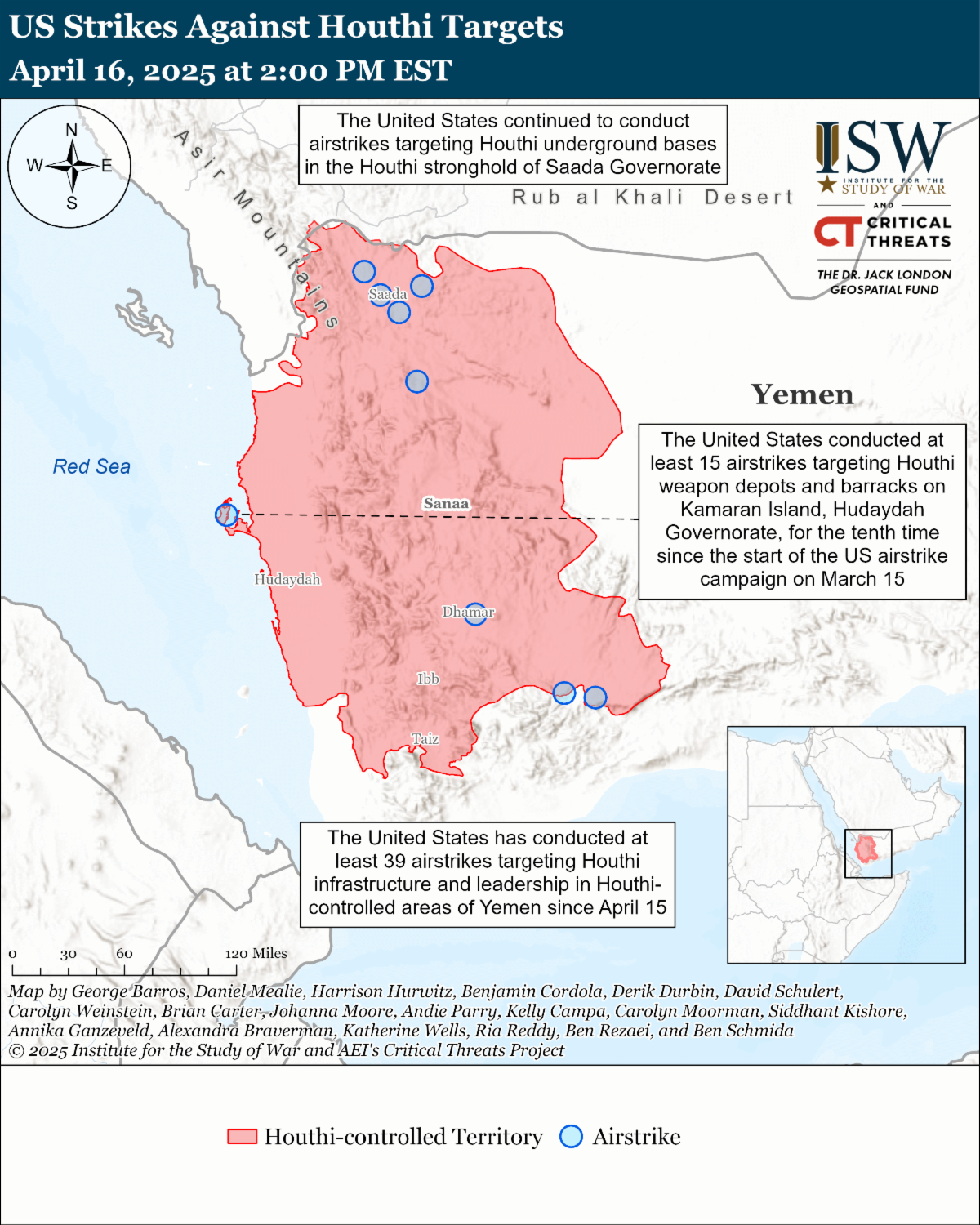Iran is unlikely to accept zero uranium enrichment and full dismantlement of its nuclear program. Iranian Foreign Affairs Minister Abbas Araghchi stated on April 16 that uranium enrichment is a “real and undeniable right” and “not subject to negotiation.” Araghchi stated that “contradictory” US positions do not help the negotiations and emphasized that “Iran must hear Washington’s real stance” to assess whether a framework agreement is possible. Araghchi likely referred to recent remarks by US Special Envoy to the Middle East Steve Witkoff regarding "zero uranium enrichment," in which Witkoff originally said Iran could enrich uranium to 3.67 percent before clarifying that any nuclear deal must “stop and eliminate” Iranian nuclear enrichment. Iranian officials have consistently rejected the concept of zero uranium enrichment and stated that Iran may reduce enrichment to Joint Comprehensive Plan of Action (JCPOA) levels. Iranian Expediency Discernment Council member and former Islamic Revolutionary Guards Corps (IRGC) Commander Mohsen Rezaei separately stated on X on April 16 that US statements reflect ”confusion and disarray” within the Trump administration and reinforce Iranian distrust caused by the U S withdrawal from the JCPOA in 2018. Rezaei’s remarks align with Iranian Supreme Leader Ali Khamenei’s guidance in his April 15 speech. Khamenei said Iran must “proceed carefully” in the US-Iran talks and signaled deep skepticism toward the United States while supporting negotiations to mitigate pressure and preserve regime stability. Khamenei will likely remain skeptical of any agreement with the Trump administration, given Trump’s decision to withdraw from the JCPOA.
Recent statements by unspecified US officials suggested the reported US drawdown in Syria will decrease US forces to no less than 1,000, roughly the same amount of US forces present in Syria before the recent increase in 2024. An unspecified US official told Reuters on April 15 that the United States may decide to reduce its force presence in Syria by half, which would be consistent with the size of previous US deployments in Syria. The official said that the US plans to reduce its presence in Syria and that this could reduce US troops to approximately 1,000 personnel. A second unspecified US official said that the size of the US withdrawal is uncertain but was ”skeptical of a decrease of that scale, suggesting that the drawdown will be no less than 1,000 personnel. Earlier reports in Israeli media lacked this context and reported that the United States will begin to withdraw from Syria by mid-June 20255. The Trump administration ordered the US Defense Department to begin preparing plans for the withdrawal of US service members from Syria in early February 2025. The United States maintained roughly 900 US personnel in Syria between 2019 and 2024, when the United States increased the number of troops to 2,000 US personnel to meet CENTCOM requirements. It is unclear if the October 7 War or the fall of Assad increased CENTCOM’s force requirements.
The United Arab Emirates (UAE) is probably exploring the possibility of a Yemeni government offensive against the Houthis, while the UAE also attempts to avoid triggering Houthi attacks on the Emirates. The UAE has discussed a ground offensive with US officials in recent weeks. US private security contractors are also reportedly advising Yemeni factions backed by the UAE to support a ground offensive, suggesting possible Emirati involvement. The UAE has extensively used private contractors in Yemen, and it is doubtful that UAE-backed factions could hire private contractors without Emirati approval. Bloomberg separately reported on April 16 that the Yemeni Armed Forces are discussing a potential ground offensive with the United States and Gulf Arab allies to remove the Houthis from the Red Sea coast, citing people involved in the discussions.
Key Takeaways:
- Iran is unlikely to accept zero uranium enrichment and full dismantlement of its nuclear program. Iranian Foreign Affairs Minister Abbas Araghchi stated on April 16 that uranium enrichment is a “real and undeniable right” and “not subject to negotiation.”
- Recent statements by unspecified US officials suggested the reported US drawdown in Syria will decrease US forces to no less than 1,000, which is roughly the same amount of US forces present in Syria prior to the recent increase in 2024.
- At least 25 Arab tribes have condemned the US-backed Syrian Democratic Forces (SDF) since April 14, probably in reaction to continued SDF demands to decentralize Damascus’s control in northeastern Syria.
- The United Arab Emirates (UAE) is probably exploring the possibility of a Yemeni government offensive against the Houthis while the UAE also attempts to avoid triggering Houthi attacks on the Emirates. A senior Emirati official denied reports that the UAE is involved in a ground campaign plan, probably out of concern that Emirati involvement in a Yemeni government offensive would trigger attacks.
- Oman-based Houthi spokesperson and chief negotiator Mohammed Abdulsalam has a multitude of different responsibilities within the Houthi regime, including smuggling and intelligence operations, according to Yemeni media investigations. The Houthis, supported by Iran, have long used communications equipment to maintain internal control and oppress the Yemeni population.
| 




 [ISW] 러시아 점령 업데이트, 2025년 4월 17일
[ISW] 러시아 점령 업데이트, 2025년 4월 17일
 [ISW] 러시아의 공세 캠페인 평가, 2025년 4월 16일
[ISW] 러시아의 공세 캠페인 평가, 2025년 4월 16일